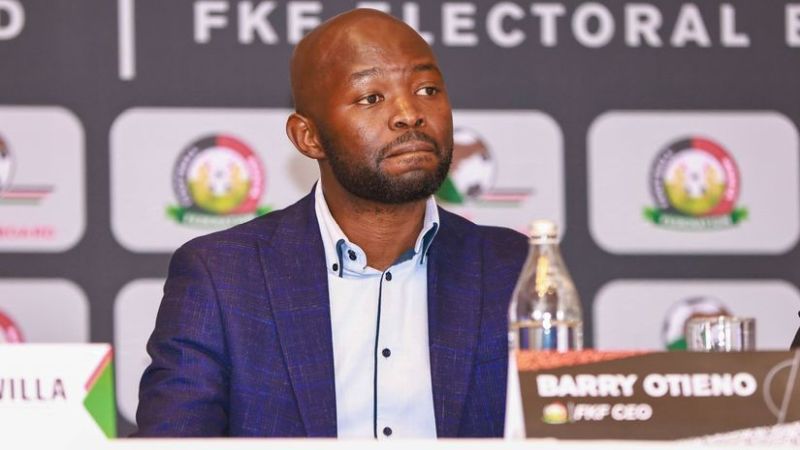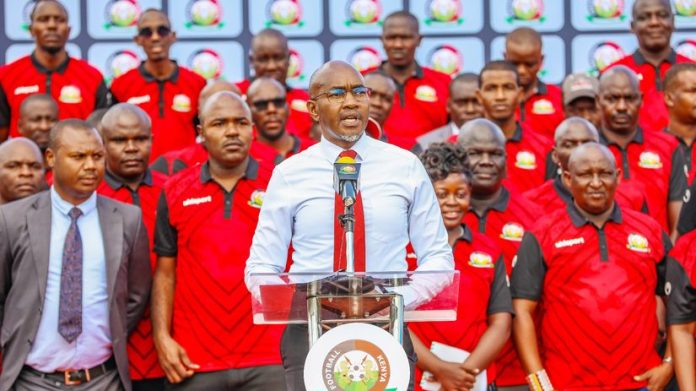The Football Kenya Federation (FKF) has appointed Patrick Korir as its interim Chief Executive Officer following the resignation of Barry Otieno. Otieno’s departure marks the end of a five-year tenure that began in 2019, during which he succeeded Robert Muthomi. This leadership change is expected to guide FKF through a crucial transition period as it prepares for future elections and structural reforms. In this article, we delve into the implications of this move, Korir’s background, and what it means for the future of Kenyan football.
The End of an Era: Barry Otieno’s Resignation
Barry Otieno’s decision to step down as FKF CEO has taken many by surprise. His tenure, which began in 2019 after he succeeded Robert Muthomi, was characterized by both growth and challenges. Initially, Otieno served as FKF’s head of communications for three years before rising to the top executive position. During his leadership, he navigated the federation through various reforms, sponsorship negotiations, and governance matters. However, his tenure was not without controversy, as FKF faced scrutiny over its management and transparency in recent years.
Otieno’s resignation leaves a void at the helm of FKF. It is essential for the federation to maintain stability during this transition, especially with the upcoming elections and the pressure to restore the public’s confidence in Kenyan football governance. The federation’s swift response in appointing an interim CEO demonstrates its commitment to ensuring continuity and minimizing disruption.

Who Is Patrick Korir? A Deep Dive Into the Interim CEO’s Background
Patrick Korir is no stranger to the football scene in Kenya. With an extensive background in sports administration, journalism, and event coordination, he is well-equipped to steer FKF through this interim period. Korir’s most notable role was as CEO of Nairobi City Stars, where he demonstrated strong leadership skills and a deep understanding of football management. His experience in coordinating major events like the Chapa Dimba Na Safaricom tournament further highlights his competence in managing high-pressure, large-scale operations.
Korir’s involvement in the Kenyan football ecosystem goes beyond administrative roles. As a journalist, he covered various local and international football events, providing him with a broader perspective on the sport and its stakeholders. This multifaceted experience gives Korir an edge in understanding both the operational and strategic aspects of football management. His ability to adapt to different roles within the industry positions him as an asset to FKF during this period of change.
The Importance of a Smooth Transition
With Patrick Korir stepping in as interim CEO, FKF aims to ensure that its operations continue seamlessly. The federation has indicated that Korir’s interim role will extend until the current term expires in December. This timeline allows FKF to focus on the immediate tasks at hand, such as preparing for the upcoming elections and maintaining the federation’s activities without disruption.
Korir’s wealth of experience as a football administrator and journalist is expected to be instrumental in maintaining stability within the organization. His familiarity with FKF’s structure, coupled with his history of managing football clubs and events, equips him to handle the responsibilities that come with the role. The federation’s choice of an interim CEO with such credentials reflects its intent to provide a steady hand during this transitional phase.
ALSO READ:
- Barry Otieno Steps Down as FKF CEO, Sets Stage for Possible Election Bid
- Kakamega Homeboyz Chairman Cleophas Shimanyula Outlines Comprehensive Plan with Four Major Reforms in His Bid for FKF Presidency
- 5 FKF presidential aspirants call for electoral transparency amid allegations of voter register tampering
What This Means for FKF and Kenyan Football
The appointment of Patrick Korir as interim CEO signifies FKF’s commitment to ensuring continuity in its operations. With the current term expected to end in December, FKF has just a few months to stabilize its internal processes and set the stage for new leadership. This period will be crucial, as it gives FKF an opportunity to reflect on its governance strategies, strengthen its operational frameworks, and prepare for upcoming elections.
Korir’s role is not only to manage FKF’s daily operations but also to implement strategic decisions that can shape the future of Kenyan football. As a professional with experience in multiple facets of the sport, Korir has a unique opportunity to influence policy and organizational reforms that could enhance the federation’s credibility and effectiveness.

Moreover, the choice of Korir as interim CEO also addresses the immediate need for a neutral figure who can manage FKF’s affairs without conflicting interests. As he steps into this leadership role, the focus will be on maintaining transparency and accountability—two factors that have been pivotal in the public discourse surrounding FKF’s management in recent years.
FKF’s Next Steps: What Lies Ahead?
As FKF navigates this transitional period, several key issues will come to the forefront. First, the federation must ensure that the election process is conducted fairly, and that candidates have a level playing field. Barry Otieno’s departure opens up possibilities for new leadership, and the incoming CEO will need to tackle the challenges of managing expectations from both fans and stakeholders.
Second, FKF must continue to build trust with the public and sponsors. With Korir at the helm, the federation is likely to focus on enhancing communication strategies, strengthening partnerships, and improving transparency. His background in journalism and sports management provides him with the tools necessary to effectively communicate FKF’s vision and goals to its various audiences.
Third, Korir’s interim period could set the tone for long-term changes in FKF’s governance structure. His experience with Nairobi City Stars and other football events will be critical in reviewing and implementing policies that align with best practices in sports administration. This transitional period is an opportunity for FKF to not only stabilize but also evolve and adapt to the demands of modern football governance.
A Strategic Appointment for Stability
Patrick Korir’s appointment as interim CEO of FKF following Barry Otieno’s resignation is a strategic move aimed at providing stability during a crucial period for Kenyan football. With a background that spans journalism, event coordination, and football management, Korir brings a wealth of experience that is vital for maintaining continuity in FKF’s operations.
His temporary tenure, lasting until December, provides FKF with the time needed to organize and prepare for a new phase of leadership. As the federation gears up for the upcoming elections, Korir’s role will be pivotal in ensuring a smooth transition and upholding FKF’s commitment to transparency and effective governance.
The future of FKF depends on the successful navigation of this transition. With Patrick Korir at the helm, there is optimism that FKF can emerge stronger and better positioned to lead Kenyan football into a new era.



